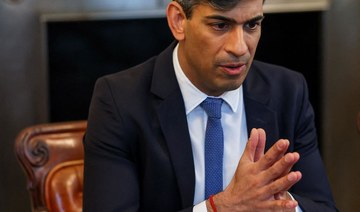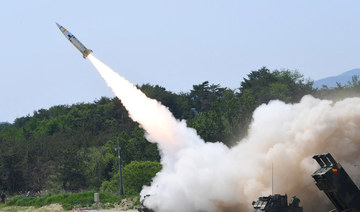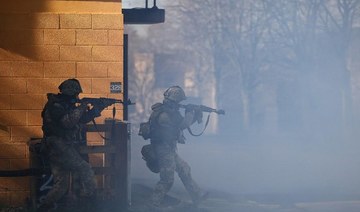TALUSTUSAN, Philippines: The American priest’s voice echoed over the phone line, his sharp Midwestern accent softened over the decades by a gentle Filipino lilt. On the other end, recording the call, was a young man battered by shame but anxious to get the priest to describe exactly what had happened in this little island village.
“I should have known better than trying to just have a life,” the priest said in the November 2018 call. “Happy days are gone. It’s all over.”
But, the young man later told the Associated Press, those days were happy only for the priest. They were years of misery for him, he said, and for the other boys who investigators say were sexually assaulted by Father Pius Hendricks.
His accusations ignited a scandal that would shake the village and reveal much about how allegations of sex crimes by priests are handled in one of the world’s most Catholic countries.
He was just 12 — a new altar boy from a family of tenant farmers anxious for the $1 or so he’d get for serving at Mass — when he says Hendricks first took him into the bathroom of Talustusan’s little rectory and sexually assaulted him.
“I asked why he was doing this to me,” the rail-thin 23-year-old said in an interview, the confusion still with him years later.
“’It’s a natural thing,’” he said the priest told him, “’It’s part of becoming an adult.’“
The abuse continued for more than three years, he says, but he told no one until a village outsider began asking questions about the American priest’s extravagant generosity with local boys, and until he feared his brother would be the next victim.
In November, he went to the police and told them what he knew.
Soon after, local authorities arrested Hendricks, 78, and charged him with child abuse. Since then, investigators say, about 20 boys and men, one as young as 7, have reported that the priest sexually abused them. Investigators say the allegations go back well over a decade — though many believe it goes back for generations, and could involve many dozens of boys — continuing until just weeks before the December arrest. Hendricks’ lawyers insist he is innocent.
The AP, which does not identify alleged victims of sexual assault, has met with five of the accusers.
Hendrick’s arrest was a sudden fall for a priest who had presided over this community for nearly four decades. He rebuilt Talustusan’s chapel and installed rooftop loudspeakers to summon parishioners to Mass. He pressed officials to pave the village road. He drove the sick to the hospital, and paid school fees for poor children. Many here will still tell you how much he did.
But the case also reflects much about the Philippines, a country where the church has long shrugged off the presence of its sex offenders and where the criminal justice system often ignores the problem.
“It’s a culture of coverup, a culture of silence, a culture of self-protection,” said the Rev. Shay Cullen, an Irish priest who has spent decades in the Philippines and works with victims of child sexual abuse. “It’s a silent consent to the abuse of children.”
In 2018, after the young man had gone to police — but before Hendricks had been arrested — he recorded a phone call with the clergyman.
In extracts of the conversation heard by the AP, Hendricks laments the passing of those happy days, and admits to an unspecified “mistake on my part.”
“Well, it’s true. I’m not saying it’s not. Did I say it’s not?” Hendricks said, his voice a combination of self-pity and resignation.
He said he’d probably have to retire.
“So I have to learn,” he continued. “I have to take the good with the bad.”
____
For nearly two decades, the Philippine church has vowed to confront a looming shadow of clergy abuse.
In 2002, the Philippines’ national conference of bishops ended years of silence to admit that the church faced “cases of grave sexual misconduct” among the clergy. One archbishop estimated that 200 of the country’s 7,000 priests may have committed some form of sexual impropriety. The bishops promised new rules that would “provide steps for profound renewal.”
But in a country home to more than 80 million Catholics and churches that date to the time of Shakespeare, such promises have long disappeared into a haze of tradition, piety and clerical influence that suffuses everything from sex education classes to national politics.
Until about 2013, for example, the church’s own guidelines insisted bishops did not need to report sexually abusive priests to police, saying they had “a relationship of trust analogous to that between father and son.” Media reports and legal action “adds to the pain” in cases of sexual abuse, Manila Cardinal Luis Tagle told the Catholic news site UCAN in 2012. In Asian cultures, he said, it is often better for such cases to be handled quietly, inside the church.
The church’s influence remains vast here, even as it has seen its power chipped away in recent years, weakened by the spread of evangelical missionaries and attacks by the nation’s populist president, Rodrigo Duterte.
Duterte, who says he was sexually abused by a priest while he was a student, has publicly derided bishops as “sons of bitches,” and urged Filipinos to stop going to Mass. Investigators say Duterte is closely watching the Hendricks case.
On Biliran, the poor island where Hendricks spent nearly half his life, his fondness for boys had been widely discussed for decades among villagers, local officials and, according to a former Catholic brother, members of the clergy. While many people had long believed he was a pedophile, almost nothing was said openly. Nor did anyone act on the suspicions.
That’s how it happens across the Philippines. Silence continues to shield priest after priest.
On the island of Bohol, the priest Joseph Skelton serves mass, more than 30 years after the then-seminarian was convicted of sexual misconduct with a 15-year-old boy. Local news reports reveal even more working clergyman: the priest outside Manila who recruited young men for the priesthood after admitting to sexually assaulting teenage boys; the priest who moved into a bishops’ residence after being accused of raping a 17-year-old girl; the composer of sacred music accused of sexually abusing boys as young as six.
Prosecutions of accused priests are exceedingly rare here, and convictions are rarer. “No priest in the Philippines has ever been convicted” of child sexual abuse, Bishop Buenaventura Famadico, who oversees a diocese south of Manila, told the Catholic newspaper La Croix last year.By comparison, the group BishopAccountability.org says that since 1990 more than 400 priests have been convicted in the US on child sexual abuse charges.
The 23-year-old from Talustusan said he might not have come forward without encouragement from an American visitor to the village, the boyfriend of a woman related to an accuser. The American was shocked at the gifts the priest had doled out to him and other local boys and began to ask probing questions.
“He kept asking why Father Pius was doing these things for boys in the village,” said the 23-year-old, who began wrestling then with his own feelings about what he should say.
“I thought this might be it, this might be the help I’m asking for, that my life will change,” he said. Finally, he told his family, and then local authorities, about the abuse.
Even then, the case may not have gone anywhere without intervention by the US Department of Homeland Security. The agency started its own probe of Hendricks under a statute that allows the US government to prosecute child sexual abuse by American citizens anywhere in the world.
The local case against the priest would have stalled if US authorities hadn’t started their inquiry, pressuring Philippine authorities to act, according to an investigator involved in the case, speaking on condition of anonymity because the investigation is still under way.
____
Kenneth Hendricks was born in 1941 in working-class Cincinnati, as the Great Depression was grinding to an end. His parents divorced when he was young, and Hendricks’ mother supported her two sons by cleaning houses.
By his late teens, Hendricks was interested in the Franciscans, the Catholic order of brothers and priests known for their long brown robes and centuries of work among the poor.
Hendricks became a Franciscan brother by his early 20s, taking the name Pius. His assignments ranged from the St. Catherine Indian School in Santa Fe, New Mexico to the then-rough Cincinnati neighborhood of Over-The-Rhine, where he helped run a youth boxing club.
His branch, the Province of St. John the Baptist, declined comment on his work, saying in a statement that it was “fully cooperating with the authorities.”
Residents say Hendricks was still a Franciscan when he found his way to Talustusan, a village of about 2,000 people a couple miles uphill from the coast. It was a quiet place with dirt roads, a small school and a time-worn chapel above the Anas River. He left the Franciscans around 1986 and soon after was ordained as a priest by the local diocese.
While Hendricks never learned to speak Bisaya, the primary local language, he seemed to love the village. He told his parishioners that he’d be buried one day in a storage room behind the chapel. “’Here is my tomb!’” he’d call out cheerfully, pointing to four concrete slabs set into the floor, near a battered statue of the Virgin Mary with broken hands and carefully manicured eyebrows.
But he never fit in fully. His quick temper and sharp tongue were intimidating. He chastised toddlers for not sitting at the front of the Talustusan chapel, and publicly berated adults who annoyed him. “Crazy Filipino people!” he would snap when he was frustrated.
Then there were the boys.
They stayed at Hendricks’ house, rode in his car and walked with him through Talustusan, residents say. He gave them gifts ranging from clothing to money to school fees.
“All of us knew about Pius and his boys,” said a former Catholic clergyman who worked with Hendricks for years, and who spoke on condition of anonymity, fearing retaliation from the church.
Once, at a gathering of priests and others, he said he erupted angrily at Hendricks, calling him a pedophile. That brought the clergyman a quick rebuke from church authorities who told him to keep quiet. Church officials declined to comment.
“All of them knew about Pius,” he said of church leaders on the island, the anger still in his voice years after the confrontation.
Similar comments are echoed in Talustusan, where there is no indication police or church authorities looked into the allegations.
“Ever since I was young I heard the stories, that he would touch altar boys,” said a longtime village resident, who also spoke on condition of anonymity, fearing backlash from her neighbors.
Even the local prosecutor barely blinked when the case was brought to her.
“I was not really surprised, because he was always with small boys,” said Edna Pitao-Honor. “We were friends, actually. But that ends when he’s facing prosecution.”
Yet the church has done little to reckon with its role in what investigators now say was years of his abuse.
The Rev. Romulo Espina, a top official in the Diocese of Naval, where Hendricks served, insisted neither he nor other diocesan leaders saw any signs of sexual mistreatment by the American.
But Espina, who worked regularly with Hendricks in a small cluster of offices behind the main regional cathedral, also quickly made clear that if Hendricks did anything wrong, the church bears no responsibility.
“If it is true, was he told to do it? No,” Espina said. “You cannot attach the behavior to the institution. It is the devil.”
Hendricks, Espina said, was told something similar.
“If there is a criminal case, we told him ‘This is your fight. You have to face the music.’“
___
Poverty is deeply rooted in Talustusan, where many people get by working on nearby coconut plantations or rice paddies. Others run informal gas stations, selling gasoline in old Pepsi bottles, or operate home groceries where they offer tiny bars of soap and packets of instant coffee for a few cents apiece.
For a village like Talustusan, having its own priest — particularly an American one — meant a financial boost, with donations to rebuild the chapel, and jobs as drivers and clerks. Hendricks became the center of his own small economy, doling out jobs, loans and gifts. He built a little library, where theological texts (The Law of Christ, The Catholic Catechism) sit beside secular fare (two biographies of Justin Bieber, a British royal wedding video).
His presence also brought status, setting Talustusan apart from the other poor farming villages.
“We were the only village that had our own priest!” said Ayelina Abonales, 55, one of the group of local women who now fiercely defend Hendricks.
For parents, having a church also meant their sons could earn a little money by serving as altar boys.
In a tradition common in Philippine villages— a custom often observed to this day — altar boys were expected to stay overnight on Saturdays at the priest’s house. That way, they could get up early to prepare for Mass.
___
Sometimes, the boy would try to stay home on Saturday nights, hoping to avoid the priest and the rectory and what he knew would happen there.
But Hendricks would send other boys running to the three-room house he shared with his parents and six siblings. The house is a monument to working-class aspirations and Catholic devotion, a plain concrete building decorated with school awards, plastic rosaries and statues of Jesus. “The priest wants you back there!” they’d call to the boy, now the 23-year-old man who reported Hendricks to authorities.
His mother would insist he stay at the rectory: “It’s good for you,” she would say.
“I had to go back,” he said recently, sitting at a small beachfront restaurant, speaking above the gentle crash of the surf and the warble of karaoke singers crooning 1970s American love songs.
He believes most of Hendricks’ altar boys were sexually abused, with some occasionally confiding in others about what was happening. But mostly, he says, it was a silent brotherhood of shame.
Victims say the abuse often started off with Hendricks’ bathing them, then progressing to oral and anal sex. Boys would often be cast aside once they reached their late teens or got involved with girls.
“He got jealous” if someone had a girlfriend, said a teenager from a troubled village family who said he was abused at age 15. The assaults ended after a couple months, the teenager said, when he refused to work as an altar boy.
Even now, the 23-year-old can’t explain why he kept returning to the rectory.
“It’s like I was trapped,” he said. “I don’t know myself anymore when I’m there.”
In part it was about money. Hendricks paid him a few dollars a week and eventually bought him a motorcycle. When he said he wanted to leave the village for a distant school, Hendricks built an extra room beside the family house, giving the young man his own bedroom.
“I didn’t want him to touch me. I only wanted to work for him,” the 23-year-old said. “But then I was depending on him.”
Things finally changed in 2015 with a case of “tulo” — gonorrhea — which he says he got from Hendricks. After that “I did not let him touch me anymore,” he said.
Most of Hendricks’ accusers are from the lower rungs of the village’s economic ladder, tough-talking teenagers with spiked hair and a love for noisy motorbikes.
Occasionally, though, their defenses drop. At one point, the 23-year-old’s voice drifts away, and he begins addressing Hendricks directly: “Father, how could my life be without you? And why are you doing this to me?“
He craves an apology: “I want him to feel that inside I am already destroyed.”
Experts say victims can have immense trouble breaking away from their abusers, many of them adept manipulators who have woven themselves deeply into children’s lives.
That confusion is amplified when abusers are priests, often revered as Christ-like figures in the Philippines, and amplified further when the priests are foreigners.
A foreign priest “would be beyond any suspicion, and any complaint would be denied and covered up,” said Cullen, the Irish priest.
Even during the recorded phone call, the 23-year-old found no victory. He apologized repeatedly for what the priest was going through, even as he tried to get Hendricks to say outright what he had done.
“I’m so sorry about it, Father,” he said. “I’m so sorry.”
___
In 2016, the Philippine church again committed itself to change, vowing “transparency, accountability and cooperation with civil authorities” in clergy child abuse cases.
As a result, over the past few years, bishops and priests have launched awareness campaigns and run training sessions. Official guidelines now spell out victims’ rights and bar moving predatory priests.
Inside the church, such regulations are seen as ground-breaking.
“From their perspective, they’re making huge changes,” said Dr. Gabriel Dy-Liacco, a Manila-based psychotherapist who has studied sexual abuse and is a member of Pope Francis’ sex abuse advisory board.
But even as the church promises change it also appears to spread the blame, with a 2016 statement from the bishops’ conference saying abused children are “not necessarily the passive partner in an exploitative relation.”
The government, meanwhile, is often openly intimidated by the church’s influence.
Pitao-Honor, the prosecutor who filed the charges against Hendricks, noted in court documents that the priest’s stature, and the chaos that accusations against him could spark in Talustusan, made her proceed very carefully “as if treading on top of eggshells piled one after the other.”
Plus, some key issues, such as when predatory priests must be reported to civil authorities, remain confusing , and experts say abuse cases rarely get reported. The Philippine church declined to respond to questions on those and other issues.
Silence remains the rule.
“Very often it’s taken care of quietly, and outside of the public sphere,” said Dy-Liacco.
___
There are those in Talustusan who mourn for Hendricks.
“I don’t understand why they say these things about Father Pius,” said Edrich Sacare, a 37-year-old from an impoverished family who spent nearly a decade living with Hendricks, working as an altar boy and at the church. Hendricks, in turn, sent Sacare to school. He insists he never saw Hendricks behave improperly. “Father Pius was strict, but he was kind to people.”
A balding man in a basketball jersey, Sacare is in obvious pain as he speaks about Hendricks’ arrest.
“Anyone who asked, Father Pius was willing to help,” he said, sitting on the porch of his house, a short walk from the church. On the wall is a poster from his 7-year-old daughter’s birthday party.
The accusations have divided the village, cutting through friendships and families and isolating the accusers, who say the benefits Hendricks brought — status, money, jobs — blinded villagers to his crimes. Often, the accusers say, they are shunned on the streets by people they have known all their lives.
Hendricks’ supporters say the accusers invented the charges, angry the priest stopped financially supporting them. The priest’s lawyers dismiss any talk of guilt, with attorney Melvin Vaporoso declaring him “innocent of the charges.”
Numerous priests and brothers and a retired bishop who oversaw Hendricks either declined comment or did not respond to repeated messages. In Cincinnati, the archdiocese has acknowledged Hendricks received some financial support from its missionary office but added a note to its website declaring, “Fr. Hendricks is not, nor has ever been, a priest of the Archdiocese of Cincinnati.”
For now, Hendricks is being held in a Manila jail, facing Philippine and US child abuse charges that could put him in prison for decades. US Attorney Benjamin Glassman in Cincinnati, who filed the American charges, calls them “very serious, very disturbing allegations.” US investigators are also looking into whether Hendricks may have been involved in sexual misconduct during his time as a Franciscan brother in New Mexico and Ohio in the 1960s and 1970s.
Philippine jails are notoriously overcrowded, and people in contact with Hendricks say he’s losing weight and isn’t sleeping well.
Back in Talustusan his house sits empty. There’s one chair at the dinner table. A houseplant is dying on the windowsill, its leaves turning brown. The narrow single bed is neatly made.
US priest accused of abusing boys for decades in Philippines
US priest accused of abusing boys for decades in Philippines
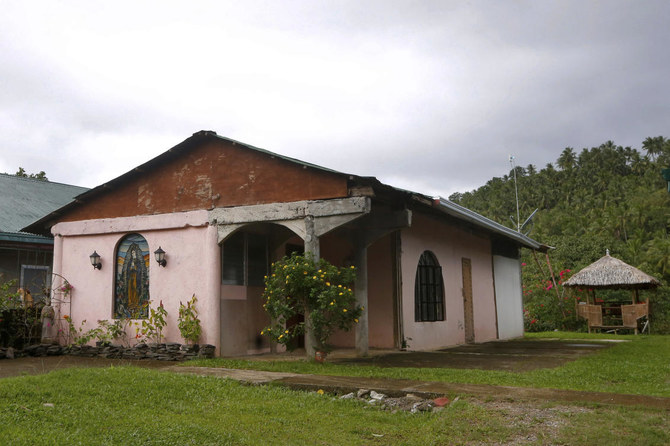
Blinken calls for US, China to manage differences
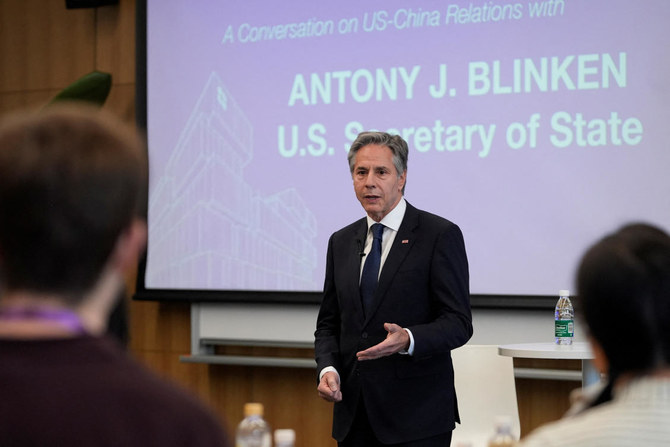
- China has not announced plans for US Secretary of State to meet Xi Jinping
- Antony Blinken is the first US secretary of state in 14 years to visit Shanghai
A day before meeting Beijing’s top brass to tackle thorny issues including Russia, Taiwan and trade, Blinken’s visit to Shanghai has seen him sample local food, watch a basketball game and stroll along the city’s famous Bund promenade.
Visiting the local Communist Party leader in a room with sweeping views of the Shanghai skyline, Blinken said US President Joe Biden was committed to “direct and sustained” dialogue between the world’s two largest economies after years of mounting tension.
“I think it’s important to underscore the value — in fact, the necessity — of direct engagement, of speaking to each other, laying out our differences, which are real, seeking to work through them,” Blinken said.
“We have an obligation for our people — indeed an obligation to the world — to manage the relationship between our two countries responsibly.”
The Chinese Communist Party secretary for Shanghai, Chen Jining, welcomed Blinken partly in English and spoke of the importance of US businesses to the city.
“Whether we choose cooperation or confrontation affects the well-being of both peoples, both countries and the future of humanity,” Chen told him.
The country’s financial capital, Shanghai is often a stepping stone to power in China, with President Xi Jinping previously serving briefly in the city.
China has not announced plans for Blinken to meet Xi, although on Blinken’s last visit in June, they saw each other in a meeting announced at the last minute.
On Thursday, Blinken also met students at the Shanghai campus of New York University, where he voiced hope for more Americans to study in China.
He insisted the United States was committed to welcoming Chinese students.
Beijing has repeatedly alleged that Chinese nationals with valid travel documents, including students, have been subject to aggressive interrogations and deportations at US airports.
“President Biden and President Xi are determined to strengthen our people-to-people ties,” Blinken said.
Blinken, the first US secretary of state in 14 years to visit Shanghai, opened his visit Wednesday evening at a restaurant serving steamed buns.
Sporting a suit without a tie, he ate with his senior staff in a shopping arcade as curious onlookers snapped pictures.
Blinken then went to watch a basketball game between the Shanghai Sharks and Zhejiang Golden Bulls, staying until the end of the nail-biting play-off.
Such softer diplomacy, once a staple of US-China relations, would have been unimaginable until recently, with hawks in both countries speaking of an emerging new Cold War.
Blinken’s aides hope his smiling persona at public events draws an implicit contrast to his Russian counterpart Sergei Lavrov and his gruffer approach when he visited China earlier this month.
Blinken is expected to raise concerns about China’s relationship with Russia when he meets the leadership in Beijing.
Although US officials were initially pleased that Beijing has not shipped weapons to Russia for its war in Ukraine, they now say that China’s alarm at Moscow’s setbacks on the battlefield has prompted it to export vast quantities of industrial supplies to Russia.
US officials believe China is more receptive to Western concerns as it seeks to focus on managing economic headwinds at home and wants to avoid friction with the West.
But China is also furious about a series of moves by Biden — who is facing a tough re-election fight in November against Donald Trump — they say serve to constrain the Chinese economy.
Most recently, the US Congress approved legislation that would force the divestment of blockbuster social media app TikTok from its Chinese owners or face a ban in the world’s largest economy.
Biden supports the legislation, arguing that TikTok, popular among young people, poses security and privacy concerns. China has accused the United States of unfair economic coercion.
Unusually, Trump has distanced himself from a TikTok ban. He has otherwise championed a tough line on China, with vows to raise tariffs drastically if he returns to office.
US officials also say that Blinken will encourage China to act with restraint as Taiwan inaugurates a new president next month.
China claims the self-governing democracy as its own and has not ruled out using force to seize it.
Privately, US officials were relieved by China’s approach during Taiwan’s election, believing that easing US-China tensions helped.
They assessed that Beijing’s assertive military moves did not go beyond past precedent.
Rwanda’s Hope Hostel once housed young genocide survivors. Now it’s ready for migrants from Britain
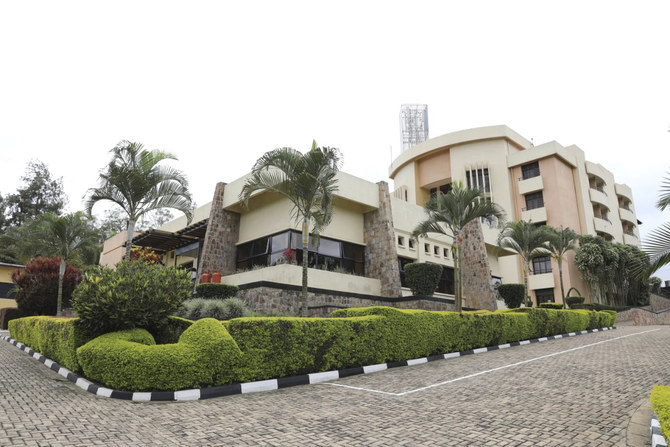
KIGALI, Rwanda: Rwanda says it’s ready to receive migrants from the United Kingdom after British Parliament this week approved a long-stalled and controversial bill seeking to stem the tide of people crossing the English Channel in small boats by deporting some of them to the East African country.
There is even a place ready and waiting for the migrants — a refurbished Hope Hostel in the vibrant upscale neighborhood of Kagugu, an area of the Rwandan capital of Kigali that is home to many expats and several international schools.
The hostel once housed college students whose parents died in the 1994 genocide, this African nation’s most horrific period in history when an estimated 800,000 Tutsi were killed by extremist Hutu in massacres that lasted over 100 days.
British Prime Minister Rishi Sunak has pledged the deportation flights would begin in July but has refused to provide details or say about how many people would be deported.
Rwanda government’s deputy spokesperson Alain Mukuralinda told The Associated Press on Tuesday that authorities here have been planning for the migrants’ arrival for two years.
“Even if they arrive now or tomorrow, all arrangements are in place,” he said.
The plan was long held up in British courts and by opposition from human rights activists who say it is illegal and inhumane. It envisages deporting to Rwanda some of those who enter the UK illegally and migrant advocates have vowed to continue to fight against the plan.
The measure is also meant to be a deterrent to migrants who risk their lives in leaky, inflatable boats in hopes that they will be able to claim asylum once they reach Britain. The UK also signed a new treaty with Rwanda to beef up protections for migrants, and adopted new legislation declaring Rwanda to be a safe country.
“The Rwanda critics and the UK judges who earlier said Rwanda is not a safe country have been proven wrong,” Mukuralinda said. “Rwanda is safe.”
The management at the four-story Hope Hostel says the facility is ready and can accommodate 100 people at full capacity. The government says it will serve as a transit center and that more accommodations would be made available as needed.
Thousands of migrants arrive in Britain every year.
After they arrive from Britain, the migrants will be shown to their rooms to rest, after which they will be offered food and given some orientation points about Kigali and Rwanda, said hostel manager Ismael Bakina.
Tents will be set up within the hostel’s compound for processing their documentation and for various briefings. The site is equipped with security cameras, visible across the compound.
Within the compound are also entertainment places, a mini-soccer field, a basketball and a volleyball court as well as a red-carpeted prayer room. For those who want to light up, “there is even a smoking room,” Bakina explained.
Meals will be prepared in the hostel’s main kitchen but provisions are also being made for those who want to prepare their own meals, he said. The migrants will be free to walk outside the hostel and even visit the nearby Kigali city center.
“We will have different translators, according to (their) languages,” Bakina added, saying they include English and Arabic.
The government has said the migrants will have their papers processed within the first three months. Those who want to remain in Rwanda will be allowed to do so while authorities will also assist those who wish to return to their home countries.
While in Rwanda, migrants who obtain legal status — presumably for Britain — will also be processed, authorities have said, though it’s unclear what that means exactly.
For those who choose to stay, Mukurilinda said Rwanda’s government will bear full financial and other responsibilities for five years, after which they will be considered integrated into the society.
At that point, they can start managing on their own.
Russia vetoes a UN resolution calling for the prevention of a dangerous nuclear arms race in space
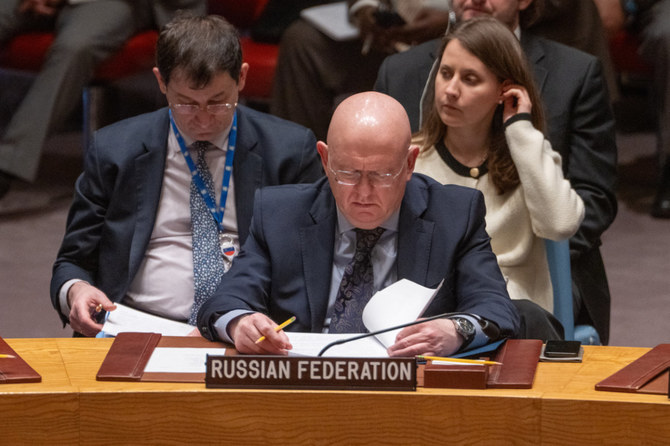
- The vetoed resolution sought to call on all countries not to develop or deploy nuclear arms or other weapons of mass destruction in space
- Russia dismissed the resolution as “absolutely absurd and politicized” and didn’t go far enough in banning all types of weapons in space
UNITED NATIONS: Russia on Wednesday vetoed a UN resolution sponsored by the United States and Japan calling on all nations to prevent a dangerous nuclear arms race in outer space, calling it “a dirty spectacle” that cherry picks weapons of mass destruction from all other weapons that should also be banned.
The vote in the 15-member Security Council was 13 in favor, Russia opposed and China abstaining.
The resolution would have called on all countries not to develop or deploy nuclear arms or other weapons of mass destruction in space, as banned under a 1967 international treaty that included the US and Russia, and to agree to the need to verify compliance.
US Ambassador Linda Thomas-Greenfield said after the vote that Russian President Vladimir Putin has said Moscow has no intention of deploying nuclear weapons in space.

“Today’s veto begs the question: Why? Why, if you are following the rules, would you not support a resolution that reaffirms them? What could you possibly be hiding,” she asked. “It’s baffling. And it’s a shame.”
Putin was responding to White House confirmation in February that Russia has obtained a “troubling” anti-satellite weapon capability, although such a weapon is not operational yet.
US National Security Advisor Jake Sullivan on Wednesday echoed Thomas-Greenfield, reiterating that “the United States assesses that Russia is developing a new satellite carrying a nuclear device.” If Putin has no intention of deploying nuclear weapons in space, Sullivan said, “Russia would not have vetoed this resolution.”
Russia’s UN Ambassador Vassily Nebenzia dismissed the resolution as “absolutely absurd and politicized,” and said it didn’t go far enough in banning all types of weapons in space.
Russia and China proposed an amendment to the US-Japan draft that would call on all countries, especially those with major space capabilities, “to prevent for all time the placement of weapons in outer space, and the threat of use of force in outer spaces.”
The vote was 7 countries in favor, 7 against, and one abstention and the amendment was defeated because it failed to get the minimum 9 “yes” votes required for adoption.
The US opposed the amendment, and after the vote Nebenzia addressed the US ambassador saying: “We want a ban on the placement of weapons of any kind in outer space, not just WMDs (weapons of mass destruction). But you don’t want that. And let me ask you that very same question. Why?”
He said much of the US and Japan’s actions become clear “if we recall that the US and their allies announced some time ago plans to place weapons … in outer space.”
Nebenzia accused the US of blocking a Russian-Chinese proposal since 2008 for a treaty against putting weapons in outer space.
Thomas-Greenfield accused Russia of undermining global treaties to prevent the spread of nuclear weapons, irresponsibly invoking “dangerous nuclear rhetoric,” walking away from several of its arms control obligations, and refusing to engage “in substantive discussions around arms control or risk reduction.”
She called Wednesday’s vote “a real missed opportunity to rebuild much-needed trust in existing arms control obligations.”
Thomas-Greenfield’s announcement of the resolution on March 18 followed White House confirmation in February that Russia has obtained a “troubling” anti-satellite weapon capability, although such a weapon is not operational yet.
Putin declared later that Moscow has no intention of deploying nuclear weapons in space, claiming that the country has only developed space capabilities similar to those of the US.
Thomas-Greenfield said before the vote that the world is just beginning to understand “the catastrophic ramifications of a nuclear explosion in space.”
It could destroy “thousands of satellites operated by countries and companies around the world — and wipe out the vital communications, scientific, meteorological, agricultural, commercial, and national security services we all depend on,” she said.
The defeated draft resolution said “the prevention of an arms race in outer space would avert a grave danger for international peace and security.” It would have urged all countries carrying out activities in exploring and using outer space to comply with international law and the UN Charter.
The draft would have affirmed that countries that ratified the 1967 Outer Space Treaty must comply with their obligations not to put in orbit around the Earth “any objects” with weapons of mass destruction, or install them “on celestial bodies, or station such weapons in outer space.”
The treaty, ratified by some 114 countries, including the US and Russia, prohibits the deployment of “nuclear weapons or any other kinds of weapons of mass destruction” in orbit or the stationing of “weapons in outer space in any other manner.”
The draft resolution emphasized “the necessity of further measures, including political commitments and legally binding instruments, with appropriate and effective provisions for verification, to prevent an arms race in outer space in all its aspects.”
It reiterated that the UN Conference on Disarmament, based in Geneva, has the primary responsibility to negotiate agreements on preventing an arms race in outer space.
The 65-nation body has achieved few results and has largely devolved into a venue for countries to voice criticism of others’ weapons programs or defend their own. The draft resolution would have urged the conference “to adopt and implement a balanced and comprehensive program of work.”
At the March council meeting where the US-Japan initiative was launched, UN Secretary-General António Guterres warned that “geopolitical tensions and mistrust have escalated the risk of nuclear warfare to its highest point in decades.”
He said the movie “Oppenheimer” about Robert Oppenheimer, who directed the US project during World War II that developed the atomic bomb, “brought the harsh reality of nuclear doomsday to vivid life for millions around the world.”
“Humanity cannot survive a sequel to Oppenheimer,” the UN chief said.
Long-awaited US military aid no ‘silver bullet’ for Ukraine
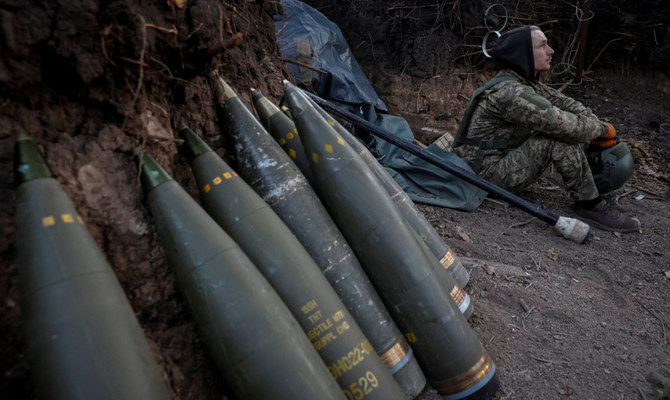
- Kyiv has been heavily reliant on billions of dollars of US military aid in its war with Russia following Moscow’s full-scale invasion in February 2022
WASHINGTON, United States: The United States is the first to acknowledge that its long-awaited $61 billion aid package for Ukraine is not a "silver bullet."
As weapons and ammunition are rushed to the country, other issues such as manpower shortages in Kyiv's struggling military have come to the fore.
Meanwhile, the monthslong delay in passing the aid package — caused by wrangling among US lawmakers — has further weakened Ukraine's position on the battleground, according to analysts.
President Joe Biden, who quickly signed the law Wednesday after it passed Congress, said the bill "should have gotten there sooner."
Jake Sullivan, his National Security Advisor, said the aid package "will make a difference," but warned "there is no silver bullet in this conflict."
"One capability is not going to be the ultimate solution," Sullivan told a White House briefing, though he added "Ukraine's position in this conflict will improve and we believe that Ukraine can and will win."
Kyiv has been heavily reliant on billions of dollars of US military aid in its war with Russia following Moscow's full-scale invasion in February 2022.
But in recent months Ukrainian forces — outgunned and outmanned — have struggled to hold back Russian troops.
And in the United States — Ukraine's largest provider of military assistance — a bogged-down Congress had not approved large-scale funding for Kyiv since December 2022 before the new package was passed this week.
It contains nearly $14 billion to train, equip and finance the needs of the Ukrainian army.
Manpower shortage
Garret Martin, of the American University School of International Service in Washington, said the delay by US lawmakers in passing the aid package "had a cost."
"The aid can shore up Ukraine but it's not a magic wand that could fix all the challenges they face," Martin said.
"What the package cannot do is deal with the shortage of manpower," he added.
Biden and his Ukrainian counterpart Volodymyr Zelensky have discussed the manpower issue, according to the White House.
In April, Kyiv reduced the minimum age for military conscription from 27 to 25, making thousands more men eligible for the draft.
And this week, it stopped issuing new passports abroad to military-aged Ukrainian men, as part of measures to push them to return home and fight.
Max Bergmann, of the Center for Strategic and International Studies, said that the impact of American aid would depend on European efforts.
"European nations need to ramp up (weapons) production now," Bergmann said.
"Europe's goal should be to put itself in a position to potentially fill a future gap left by the United States should it not pass another supplemental."
Bergmann said that Ukraine should use 2024 to "hold the line, exhaust and attrit Russian forces," with next year possibly presenting an opportunity for a Kyiv offensive.
Malala Yousafzai vows support for Gaza after backlash

- Pakistan has seen many fiercely emotional pro-Palestinian protests since the war in Gaza began last October
LAHORE, Pakistan: Nobel laureate Malala Yousafzai on Thursday condemned Israel and reaffirmed her support for Palestinians in Gaza, after a backlash in her native Pakistan over a Broadway musical she co-produced with former US Secretary of State Hillary Clinton.
Yousafzai, who was awarded the Nobel Peace Prize in 2014, has been condemned by some for partnering with Clinton, an outspoken supporter of Israel's war against Hamas.
The musical, titled "Suffs," depicts the American women's suffrage campaign for the right to vote in the 20th century and has been playing in New York since last week.
"I want there to be no confusion about my support for the people of Gaza," Yousafzai wrote on X, the former Twitter. "We do not need to see more dead bodies, bombed schools and starving children to understand that a ceasefire is urgent and necessary."
She added: "I have and will continue to condemn the Israeli government for its violations of international law and war crimes."
Pakistan has seen many fiercely emotional pro-Palestinian protests since the war in Gaza began last October.
Yusafzai's "theatre collaboration with Hillary Clinton -- who stands for America's unequivocal support for genocide of Palestinians -- is a huge blow to her credibility as a human rights activist," popular Pakistani columnist Mehr Tarar wrote on social media platform X on Wednesday.
"I consider it utterly tragic."
Whilst Clinton has backed a military campaign to remove Hamas and rejected demands for a ceasefire, she has also explicitly called for protections for Palestinian civilians.
Yousafzai has publically condemned the civilian casualties and called for a ceasefire in Gaza.
The New York Times reported the 26-year-old wore a red-and-black pin to the "Suffs" premier last Thursday, signifying her support for a ceasefire.
But author and academic Nida Kirmani said on X that Yousafzai's decision to partner with Clinton was "maddening and heartbreaking at the same time. What an utter disappointment."
The war began with an unprecedented Hamas attack on Israel on October 7 that resulted in the deaths of around 1,170 people, according to an AFP tally of Israeli official figures. Hamas militants also abducted 250 people and Israel estimates 129 of them remain in Gaza, including 34 who the military says are dead.
Clinton served as America's top diplomat during former president Barack Obama's administration, which oversaw a campaign of drone strikes targeting Taliban militants in Pakistan and Afghanistan's borderlands.
Yousafzai earned her Nobel Peace Prize after being shot in the head by the Pakistani Taliban as she pushed for girls' education as a teenager in 2012.
However, the drone war killed and maimed scores of civilians in Yousafzai's home region, spurring more online criticism of the youngest Nobel Laureate, who earned the prize at 17.
Yousafzai is often viewed with suspicion in Pakistan, where critics accuse her of pushing a Western feminist and liberal political agenda on the conservative country.





